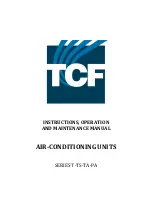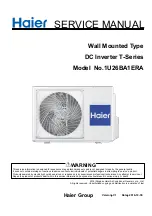
30
English
Ins
tallation
Step 1.4 Drilling a hole through the wall
Before fixing the installation plate to a wall and
then fixing the indoor unit to the installation plate,
a window frame, or a gypsum board, you must
determine the position of a hole (with 65 mm inner
diameter) through which the pipe bundle (consisting
of power and communication cables, refrigerant
pipes, and drain hose) will pass and then drill that
hole.
1
Determine the position of a 65 mm hole in
consideration of the possible directions of the pipe
bundle and the minimum distances between the
hole and the installation plate.
Left
Right
Rear right or left
<Possible directions of the pipe bundle>
Bottom right
CAUTION
• If changing the pipe direction from left to right,
do not drastically bent it but slowly turn it in the
opposite direction as shown. Otherwise, the pipe
may be damaged in the process.
Pipe bundle hole
<Minimum distances between the
hole and the installation plate>
2
Drill the hole.
CAUTION
• Be sure to drill only one hole.
• Make sure that the hole slants downwards so that
the drain hose slants downwards to drain water
well.
Wall
Drain hose
<The hole slants downwards>
Indoor unit
Step 1.5 Taping the pipes, cables, and
drain hose
1
Wrap foam insulation on parts without insulation
on the ends of the refrigerant pipes, as shown in
the figure. This wrapping minimises condensation
problem.
Insulation
Refrigerant pipes
2
Wind the refrigerant pipes, power cable,
communication cable and drain hose with vinyl
tape to make a pipe bundle.
Refrigerant pipes
(assembly pipe)
Installation plate
Vinyl tape
Drain hose
Power and communication cables
(assembly cable)
(Unit : mm)
Model
A
B
C
D
**18*******
**24*******
38
126
70
38
Pipe bundle hole: Ø 65 mm
Summary of Contents for AR NVFH Series
Page 44: ...44 English ...
Page 45: ...45 English ...
















































